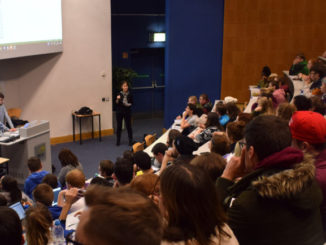
A refurbishment of Poetry Ireland’s headquarters has seen the organisation temporarily housed in the Cregan Library on DCU’s St. Patrick’s campus in Drumcondra.
The redevelopment of their 11 Parnell Square East establishment marks an “exciting new phase” according to Niamh O’Donnell, Director of Poetry Ireland, who insists the interim relocation is a “natural fit.”
“The university’s focus on connecting its students with the arts aligned well with our own goals of inclusivity and connecting people with poetry” she says.
“We hope that our presence in DCU will continue to reiterate that poetry is something everyone is invited to engage with – whether by reading, writing, or listening to a poem, and that it’s not just for those who are specifically studying it.”
Opened officially last week with a series of readings on the St. Patrick’s campus, the move surfaced with the assistance of the former chairperson Mary Shine as well as and DCU’s Cultural Arts Officer Marcella Bannon and Orla Nic Aodha alongside her library team.
It was welcomed by Prof Daire Keogh, President of Dublin City University, he is assured the relationship will provide “mutual benefit.”
“We are delighted to provide a ‘home from home’ to Poetry Ireland at DCU” he says.
“The presence of such an active and important cultural body on campus will be of great addition to the cultural life of the university.”
It comes as the college also opened the doors of it’s new Woodlock Hall art library on All Hallows Campus, enacted a new Writer-in-Residence programme and recorded their highest ever amount students in the School of English.
This sentiment was echoed by DCU’s Poetry Society chairperson, Ella Bowler who believes the arrangement “shift the aesthetic of the college” to one more accepting of the arts rather than its scientific, business or teaching associations.
“I love Poetry Ireland and I think in a more holistic sense too it’s great because it’s good to see more arts being brought into the college and DCU being recognised as an artistic centre” she says.
Ceding that the majority of people’s first interaction with the artform is in an “academic sense” at school, she believes poetry must in fact be viewed in another light in order for it to be enjoyed and explored further.
“It’s an artistic device” Bowler adds.
I just don’t think people ever got to the place where they had a space “where they can talk about weekly, workshop things, find new things to read, it’s just not something that is open to them.”
The English and philosophy student is undecided yet as to what Poetry Ireland’s transfer to DCU will mean in the day to day for the students.
“It depends how they utilise it” she comments.
“Hopefully people can engage with writers and talk about their work. More things like that would encourage the poetry set up in DCU.”
Alanna Cunnane
Image credit: Federation of European Literacy Associations



